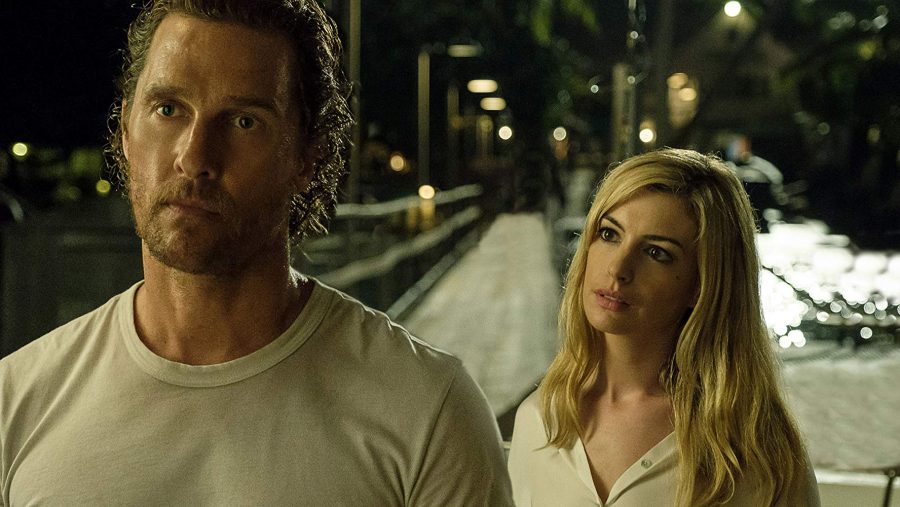The only real compelling element of the film is that it is able to keep its momentum going, luring viewers forward with hints that there’s something off about the story’s world. Like an ellipsis or a question mark, Serenity clearly leads somewhere, its twist, premise or conceit being hinted at whenever possible. Jeremy Strong plays an idiosyncratic man with a briefcase, following Baker throughout his story, while a clock ticks away in Benjamin Wallfisch’s score. Everybody on the island knows what’s going on in everybody else’s life, as gossip spreads at astounding speeds. And then there’s this connection Baker has with his son. The breadcrumbs are not hard to notice, as if Knight left whole baguettes sitting around pointing off and leading away into the distance. Something’s off, and Knight wants viewers to know it.
When Knight shows his hand, he does it more than once. He answers the question with subtlety and then makes the answer more and more obvious, beating the audience over the head with his idea that’s far from ungraspable. Someday, audiences might be lured into the film again by a Netflix category promising “Mind-bending” or “Cerebral” movies, but taking the trip to a theater would be an even bigger waste of 106 minutes.
There’s nobody to care about in Serenity. Baker doles out unkindness and then speaks wistfully about a fish he was already trying to catch when the film started. The mystique of McConaughey’s earthy voice does nothing for the words being uttered. Jason Clarke plays Frank, Karen’s cartoonishly evil husband. He doesn’t twirl a mustache, but his actions are so one-dimensionally in the camp of things bad guys do, Frank almost becomes a non-person. The victims of Frank’s abuse are similarly dehumanized, never given enough depth of character to elicit sympathy.
Hathaway recently made headlines by defending Serenity, writing in an Instagram post, “some critics get [Serenity] and, like me, find it interesting, moving, ambitious and different, and for some it just doesn’t work.” Hathaway should be commended for being open about her film’s poor standing among critics — as of this writing, it sits at a lowly rating of 20 percent positive reviews on Rotten Tomatoes — but her defense of the film upon the merit of understanding it is flawed, coming from the very nature of the work she’s a part of.
Serenity is like the result of a YouTube fan who’s seen enough explainer videos to know how much people love a good twist, but didn’t care to put much thought into the rest of their resulting movie. There’s enough going on in Serenity that the dull characterization and poor sense of morality could be explained away, but if only by getting mired in the film’s own sense of logic. But twists and alternate universes only have so much energy without a meaningful story, until they peter out and lose their own meaning. Without somebody to care about, no gimmick can save the film.
As mentioned, the best thing about Serenity is that it keeps going. The next best thing is that it goes away. The film evaporates from the mind soon after it ends. Knight’s work is unmemorable and should quickly be eclipsed by the viewing of any other, better movie — more than likely an achievable task.
Maybe even the YouTube videos that inevitably exist to explain the ending of Serenity are more compelling than the film itself. They’re best to be avoided, though. After all, a runner who only looks at the finish line may very well trip on the obstacles along the way. By the time Serenity reaches its finish line, the race has been far from worth it.








